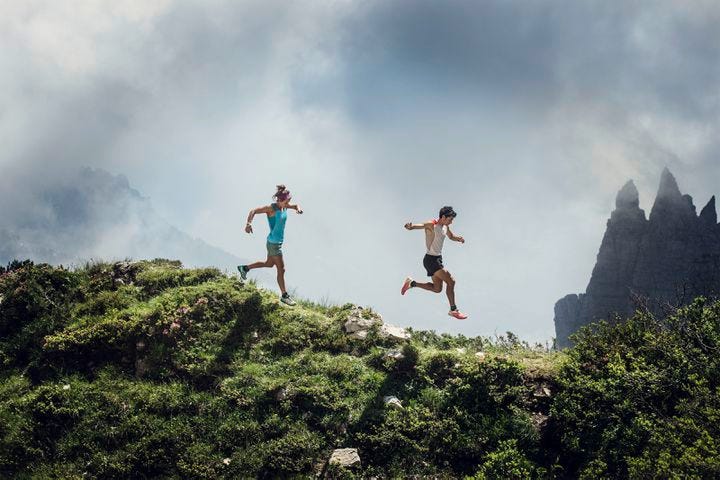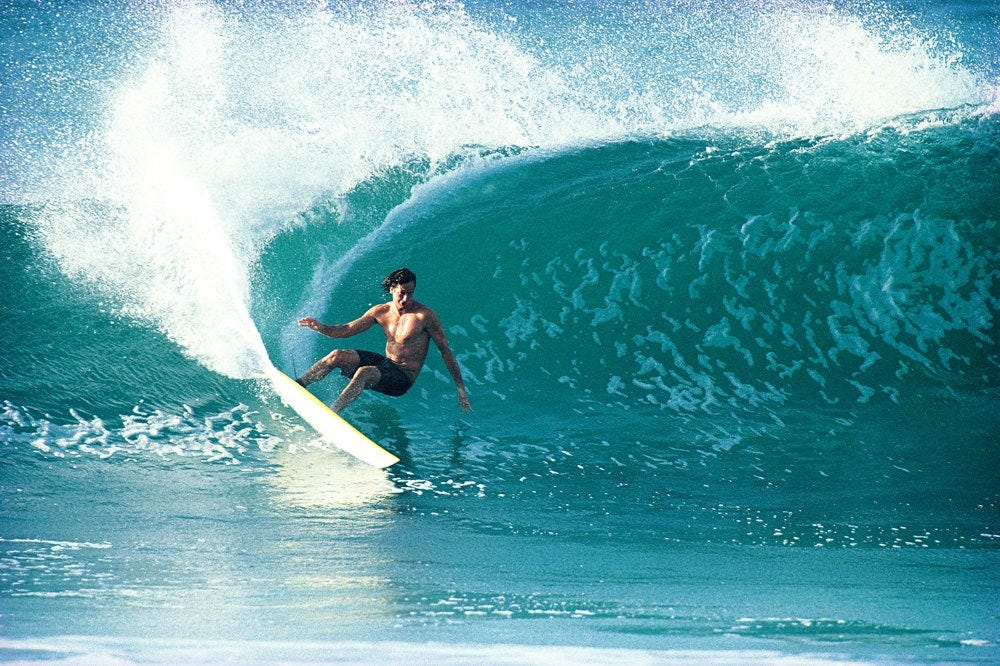On Flow II
What you’re looking for and why running is the easiest way to find it
Now, I’m not an expert on anything in particular.1
There are far smarter people than me who’ll explain what flow states are.
But mostly they’ll tell you about theories - how you define a flow state, how you trigger them, what the characteristics of flow are…
Steven Kotler’s books are decent for weaving a bit of narrative around the abstraction, particularly The Rise of Superman and Stealing Fire.
Or mainline with Mihály Csíkszentmihályi and his books, or this TED talk.
Alternatively (and this is a super hot tip) you’ll find some great stuff here.
Mostly it’s a bit science-y, which can make it sound dull, which it definitely isn’t.
All I can tell you is what it feels like and what gets me there. (In a future instalment of this ongoing series!)2
And I want to explain why running is absolutely the easiest way to experience flow.
So what is it?
In a nutshell: it’s an altered state of consciousness in which feelings of ecstasy or euphoria lead to increased skill and heightened senses.
By engaging in a practised activity with hyperfocus you can experience sensations so rewarding that they can be addictive and life affirming.
Flow can bring you both joy and purpose.
It involves doing something you enjoy, something you’ve worked at. It might be a physical activity, but it might equally be something creative. It’s likely to involve movement and channeling what you see and feel through your body.
It’s a feeling of complete absorption of the present, an abandonment of ego. You are everywhere and no-where. You are simultaneously tuned out of reality and more aware than ever before.
It’s total immersion.3 Experiences where time becomes dulled, stretched or immaterial.4
I have memories of long runs where I’ve looked at my watch then looked again a moment later and 10 miles or more have passed. My legs have been turning, but that seems incidental, somehow.
You can lose yourself entirely.
If you’ve spent any time dancing in darkened spaces you might recognise the same feelings when you find flow in running, the same trance-like state that makes you feel neither here nor there.5
Musicians often get lost in the creation of their art, or painters, or writers. In sport it’s called being “in the zone”. It’s that feeling when everything becomes easier, slower, like playing a game in cheat mode.
Gie’s some examples then...
Picture the greatest performances you’ve ever seen. Think of times when you’ve watched someone reach another level. The performance might be intense, but never strained or panicked. This is when they’re in flow.
Picture Kipchoge’s smiling face when he runs with impossible grace and speed.
Think of Kilian Jornet flowing effortlessly over absurd terrain.
Imagine Messi running through defences like the ball is stuck to him.6
Klay Thompson dropping 37 points IN A SINGLE QUARTER.
Or, for an entirely different context - Logic freestyling on Sway in the Morning.7
Now these are extreme examples with thousands of hours of dedication to their craft behind them, and of course you can’t simply step into their shoes without similar talent, drive and time.
But here’s the secret: you don’t have to in order to feel the same.
Why running?
High level performers tap into flow states, but it’s accessible to mortals, too. All you do is tweak the context and challenge. I know this because I’m not a great runner. (I might not even be an average one). But that doesn’t stop me reaching flow states in running more consistently than in anything else I’ve done.8
Because running is so simple, there’s an extremely low bar to accessing flow states in the first place.
If you run, you’re a runner.
Standing on a skateboard hardly makes you a skateboarder. Playing the intro to Wonderwall over and over again doesn’t make you a guitarist.
Flow states occur when you find the balance between challenge and skill.
The best moments in our lives, are not the passive, receptive, relaxing times—although such experiences can also be enjoyable, if we have worked hard to attain them. The best moments usually occur when a person’s body or mind is stretched to its limits in a voluntary effort to accomplish something difficult and worthwhile.
- Mihaly Csikszentmihalyi, Flow: The Psychology of Optimal Experience
You could start surfing or snowboarding today, but it might take years to build the requisite level of skill to get into flow.9 Even then you’ll need to wait for the right combination of weather, or buy a lift ticket. And of course you need lots of kit. Then you need to be there, on the right day, in the right mindset and ready.
That’s too many variables.
With running, the basic skill is attainable for everyone, immediately.
You don’t need to be Kilian Jornet skipping over ridges, your local park lap will do.
You don’t need to be moving efficiently, beautifully, or even quickly, you just need to feel like you are. It’s about engineering the right level of challenge for your skill. It’s about context.
In the best moments you feel light, hyper aware. You can be moving quickly, but you’re always in control. It should feel hard, but it doesn’t. The movement and speed are almost by-the-by. The running is happening somewhere in your subconscious.
At a certain stage, running becomes far more about what’s happening in your head rather than what’s happening on the ground.
You might be flying down scree, embracing the slide and the winging rocks, or gliding along a wooded riverbank, as if drifting with the current.
The situation doesn’t matter, what matters is how it relates to you.
I think flow is the reason running gets so addictive. The feelings won’t happen on every run. If they did it wouldn’t be so good. (Would Christmas be fun if it was every Tuesday?)
But it could happen any time, sweeping you up and away like a magic carpet. Over time, you can learn to create the circumstances that are likely to trigger it.
And that’s enough to keep you coming back. Again and again and again.
I don’t profess to be anything other than open to experience; an explorer of purpose; an idea junkie, a bit of a dreamer; or just a guy who treats obscure patches of woodland like a personal laboratory.
With the proviso that it might be a little different for everyone. I think it’s likely some personality traits affect experience.
It can be different every time. There are different triggers, different durations, vastly different intensities. (A bit like an orgasm?) And likewise there are variables according to commitment, focus, experience, connection…
Surfers talk about the concept of time slowing in the tube, like the world’s on pause. It’s a good example to illustrate the circumstances that can trigger flow states: high skill level, consequence, communion with nature, poise, challenge, control…
I’m pretty sure music is a key trigger for me, like a hack or catalyst to get me there quicker. Sometimes it’s the music itself, and sometimes it’s associated memories.
Some others that jump to mind when I think of performances where it seems athletes are operating in flow states are: Gabriel Medina, John John Florence, Alex Honnold, Michael Jordan, Tiger Woods, Tom Curren and Courtney Dauwalter.
Or Ocean Wisdom, allegedly putting this down in one take:
It can happen sometimes with writing. There are definitely times when it comes easier than others, but it’s not so clearly defined or accessible. And I’ll always go back and re-read and revise. There are few sentences I write that don’t change, and this knowledge kind of kills the buzz.
You’re not getting into a flow state while you’re getting washed over the rocks on a big blue foamie, are you? Or falling off a button tow.




I would say you probably are in a flow state going over the falls on any craft. What else are you thinking about except what you have to do to get to the surface. I fucking love getting slammed (not so much on concrete)